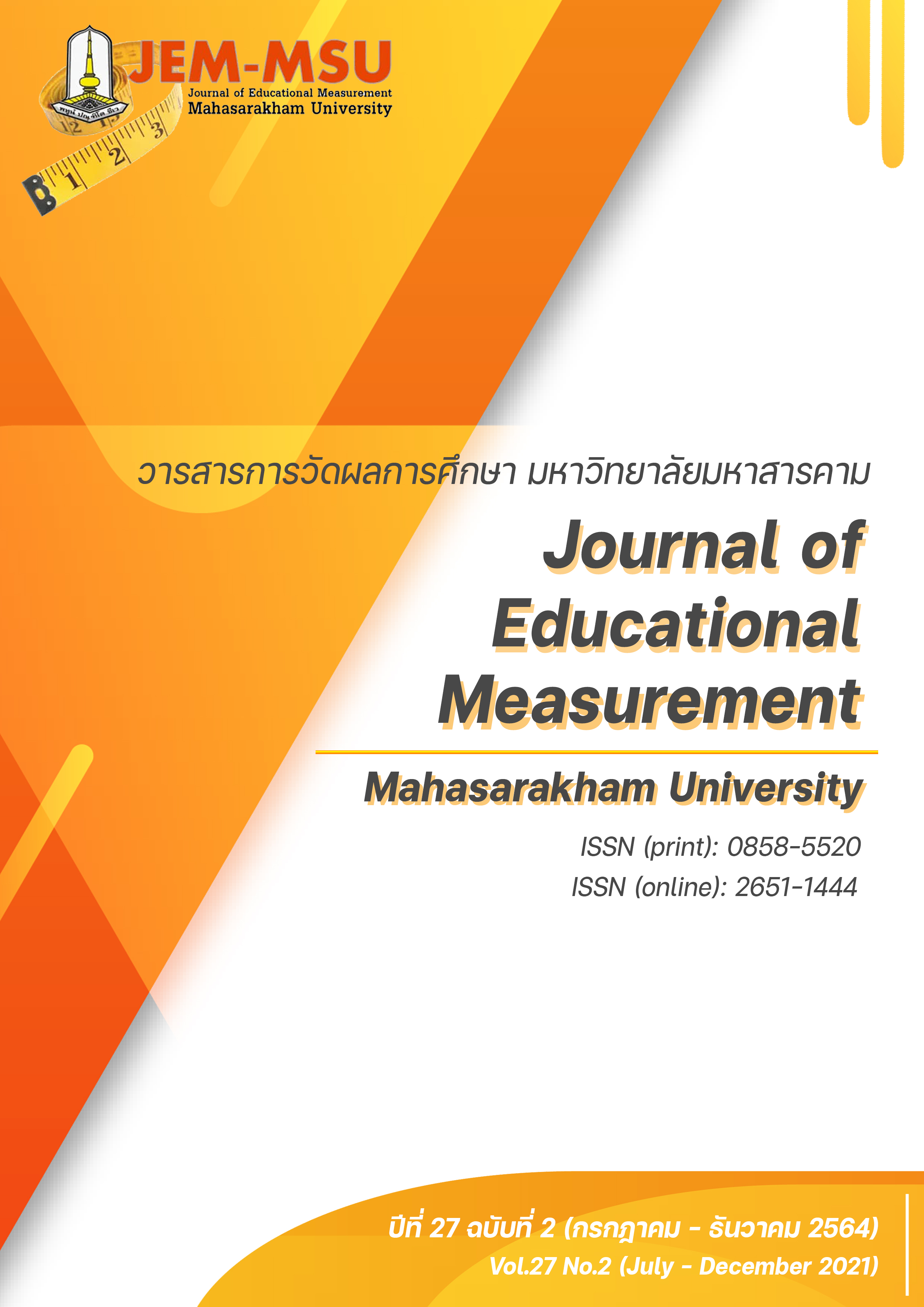Exploratory Factor Analysis with Small Sample Sizes of School-Community Collaboration
Main Article Content
Abstract
The purposes of this research were to analyze the exploratory factors of school-community collaboration with small sample sizes in student, teacher, school administrator and learning center worker groups. The survey sample was divided into 4 groups: 30 students, 30 teachers, 30 school administrators from 30 higher secondary schools, and 16 workers from learning centers in Chiang Mai Province. The research instruments were questionnaires inquiring about school-community collaboration, with reliability coefficients of .731-.897. The analysis of data employed descriptive statistics, Pearson's correlation coefficient, the Bartlett's Test of Sphericity, Kaiser-Meyer-Olkin measure of sampling adequacy (KMO), principal component analysis (PCA) and regularized exploratory factor analysis (REFA) which is suitable for small sample sizes.
The results showed that the school-community collaboration in the 4 groups had the KMO value of .586-.877. The collaboration had 3 components: 1) openness to community involvement (OCI), 2) awareness for community involvement (ACI) in the student group or vision for community involvement (VCI) in the teacher group, school administrator group and learning center worker group, and 3) commitment to learning (CTL). These components were able to explain 78%-87% of the total variance.
Article Details
The content and information contained in the published article in the Journal of Educational Measurement Mahasarakham University represent the opinions and responsibilities of the authors directly. The editorial board of the journal is not necessarily in agreement with or responsible for any of the content.
The articles, data, content, images, etc. that have been published in the Journal of Educational Measurement Mahasarakham University are copyrighted by the journal. If any individual or organization wishes to reproduce or perform any actions involving the entirety or any part of the content, they must obtain written permission from the Journal of Educational Measurement Mahasarakham University.
References
คณะกรรมการบูรณาการด้านพิพิธภัณฑ์และแหล่งเรียนรู้. (2561). ฐานข้อมูลแหล่งเรียนรู้ในคณะกรรมการบูรณาการและนอกคณะกรรมการบูรณาการ. http://mlic.okmd.or.th/download.php
Bauch, P. A. (2001). School-community partnerships in rural schools: Leadership, renewal, and a sense of place. Peabody Journal of Education, 76(2), 204-221. doi: 1.1207 /S15327930pje7602_9
Gartner, M. C., & Weiss, A. (2013). Scottish wildcat (Felis silvestris grampia) personality and subjective well-being: Implications for captive management. Applied Animal Behaviour Science, 147(3-4), 261-267.
Green, T. L. (2018). School as community, community as school: Examining principal leadership for urban school reform and community development. Education and Urban Society, 50(2), 111-135. doi: 1.1177/0013124516683997
Haines, S. J., Gross, J. M., Blue-Banning, M., Francis, G. L., & Turnbull, A. P. (2015). Fostering family–school and community–school partnerships in inclusive schools: Using practice as a guide. Research and Practice for Persons with Severe Disabilities, 40(3), 227-239. doi: 1.1177/1540796915594141
Jacobucci, R. (2017). regsem: Regularized structural equation modeling. Retrieved from https://arxiv.org/pdf/1703.08489.pdf.
Jacobucci, R., Grimm, K. J., Brandmaier, A. M., Serang, S., Kievit, R. A., Scharf, F., & Li, X. (2020). Package ’regsem’. Retrieved from https://cran.r-project.org/web/packages/regsem/regsem.pdf
Jung, S., & Lee, S. (2011). Exploratory factor analysis for small samples. Behavior research methods, 43(3), 701-709. doi: 1.3758/s13428-011-0077-9
Jung, S., & Takane, Y. (2008). Regularized common factor analysis. In K. Shigemasu, A. Okada, T. Imaizumi, & T. Hoshino (Eds.), New trends in psychometrics (141-149). Tokyo: Universal Academy Press.
Krumm, B. L., & Curry, K. (2017). Traversing School-Community Partnerships Utilizing Cross-Boundary Leadership. School Community Journal, 27(2), 99-12.
Ross, J. A., & Gray, P. (2006). School leadership and student achievement: The mediating effects of teacher beliefs. Canadian Journal of Education/Revue canadienne de l'éducation, 29(3), 798-822. doi: 1.2307/20054196
Sanders, M. G., & Harvey, A. (2002). Beyond the school walls: A case study of principal leadership for school-community Collaboration. Teachers college record, 104(7), 1345-1368. doi: 1.1111/1467-962.00206
Scharf, F., & Nestler, S. (2019). Should Regularization Replace Simple Structure Rotation in Exploratory Factor Analysis?. Structural Equation Modeling: A Multidisciplinary Journal, 26(4), 576-59. doi: 1.1080/10705511.2018.1558060
Strickland, J. L. (2016). Community partnerships in urban, title 1 elementary schools: A mixed-methods study (Doctoral dissertation). University of Nebraska, USA.
Thapa, A., & Cohen, J. (2017). School climate community scale: Report on construct validity and internal consistency. School Community Journal, 27(2), 303-32.
Úbeda, Y., & Llorente, M. (2015). Personality in sanctuary-housed chimpanzees: A comparative approach of psychobiological and penta-factorial human models. Evolutionary Psychology, 13(1). doi: 147470491501300111
Wheeler, L., Guevara, J. R., & Smith, J. A. (2018). School–community learning partnerships for sustainability: Recommended best practice and reality. International Review of Education, 64(3), 313-337. doi: 1.1007/s11159-018-9717-y


